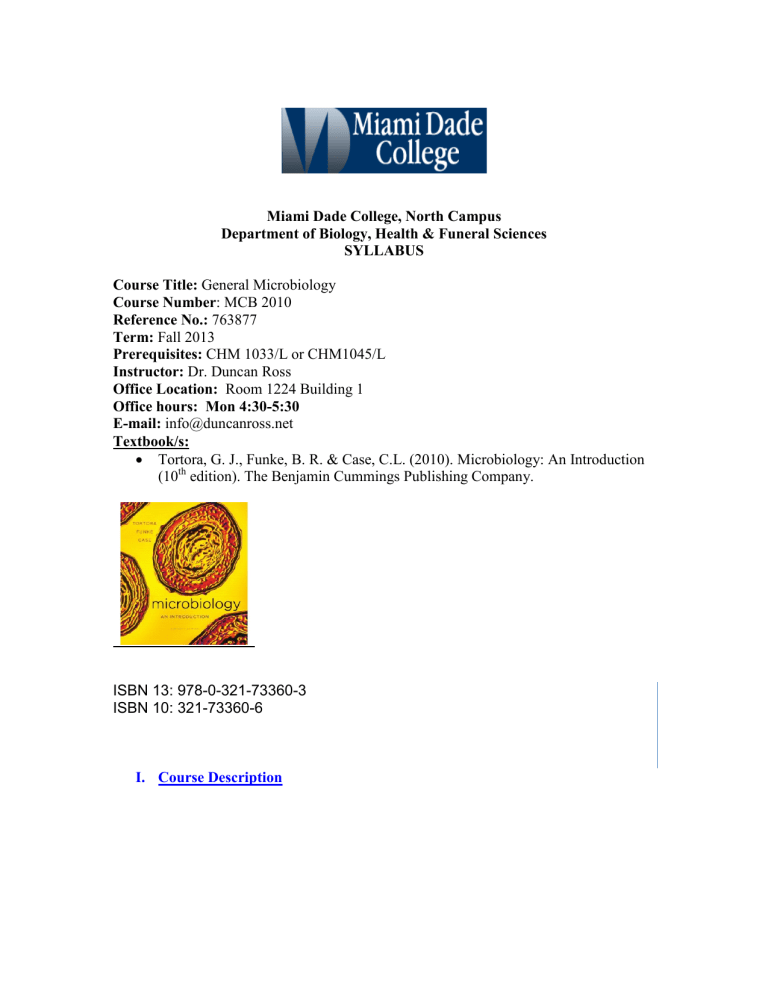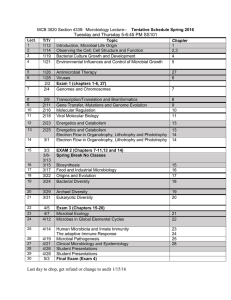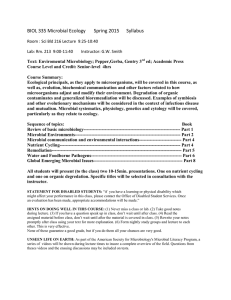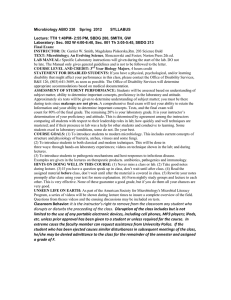
Miami Dade College, North Campus Department of Biology, Health & Funeral Sciences SYLLABUS Course Title: General Microbiology Course Number: MCB 2010 Reference No.: 763877 Term: Fall 2013 Prerequisites: CHM 1033/L or CHM1045/L Instructor: Dr. Duncan Ross Office Location: Room 1224 Building 1 Office hours: Mon 4:30-5:30 E-mail: info@duncanross.net Textbook/s: • Tortora, G. J., Funke, B. R. & Case, C.L. (2010). Microbiology: An Introduction (10th edition). The Benjamin Cummings Publishing Company. ISBN 13: 978-0-321-73360-3 ISBN 10: 321-73360-6 I. Course Description MCB 2010 course is designed to examine the foundations of microbiology, emphasizing the morphology, physiology, ecology and evolution of the microbial world. To achieve those goals we will use a variety of methods that include active learning, cooperative learning and the integration of computer literacy, that require the effective student’s engagement in its own learning. II. Goals and Competencies Students should make the effort to well describe the microbial cell structure, the carbohydrate catabolism, the microbial growth and its control, and the genetic transfer within microbial populations. Please communicate with me via email. III. Evaluation & Grading Policy • • • • Four tests (NO MAKEUP) 3 x 25 One assignment 1 x 10 Presentation (teamwork) 1 x 10 Attendance and attitude (for excellence) = 5 = = = “ 75 points 10 “ 10 “ The lowest grade in exams will be dropped III.1 Assignment (From the three proposed subjects you can choice one): 1. MRSA (Methicillin resistant Staphylococcus aureus) 2. XDR-TB (Extensively drug-resistant tuberculosis) 3. C.DIFF (Clostridium Dificile) Your work must have the following structure: 1. Title 2. Name and last name 3. Introduction 4. Microorganism description 5. Disease characteristics 6. Treatment 7. Infection prevention 8. Conclusions 9. Searched websites or other sources of information (no less than two sources). Assignment should be single-spaced and typed on Times New Roman 12. Leave adequate margins (about 3 cm). The extension of the work must be no less than 1000 words and can include 1 or 2 illustrative pictures. III.2 Presentations : They will be based in a collective work of no more than 3 student’s team to cover news, biographies and chapters of the textbook. The final work of each team will be discussed in class at the indicated date. Presentations will be supported by using multimedia resources. Presentations will cover a chapter from the book and will have no less than 20 slides. The professor will interact with the students to foster the quality of the presentations. From any of the above subjects or any other subject that is not in the list but has a high level of actualization and scientific, cultural or social importance, each team will prepare a Power Point presentation that will include. • • • • • • Slide 1: Title. Name and last name of each team member Subject Article introduction Materials and methods Results and Discussion Conclusion. (Presentation should be adjusted for 10-15 minutes and can be done by one or more students). Extra points: • Source 5 PDF files from academic Journals that relate to a topic discussed in class. Tell me the impact factor of the Journal, and write a 200 word synopsis of each article (5 points). Grading system A: 90 to 100 B: 80 to 89 C: 70 to 79 D: 60 to 69 F: 59 or under Note: Final course results will be posted after the last week of classes. Class attendance Attendance is strongly correlated with success in the course; therefore you must attend class regularly: (a) (b) I will take roll call at the beginning of each class so be punctual. Attendance and punctuality records will contribute 5 points to the final 100 point-score provided you are not absent from class more than one time. The maximum of justified absences you can have to continue in the course is three. If you expect to miss a class, test, or deadline, notify the class-professor in writing, or by phone AHEAD of time. If your request is approved, the test or deadline will be rescheduled, if applicable. Academic Dishonesty Students caught cheating on examination and/or plagiarizing literature will be assigned a grade of “F” (zero point) on that particular test and/or assignment. Cell phones Cell phone use (of any kind) is banned during class. Phones must be rendered inaudible (either turn them off completely or at least set them not to make noise) during class time. The professor can ask you to leave the classroom if your attitude is disruptive to the class. Note: During exams, any cell phone use will automatically constitute cheating (and will be dealt with as such). Learning outcomes: Besides the technical and scientific knowledge, students will further develop in this course fundamental knowledge and skills integrated in the following Miami Dade College students learning outcomes. • • • • Communicate effectively using listening, speaking, reading and writing skills. Solve problems using critical and creative thinking and scientific reasoning. Use computer and emerging technologies effectively. Describe how natural systems function and recognize the impact of humans on the environment. MIC 2010 Questions? info@duncanross.net Reading/Class Schedule Date Aug 26 Sep 9 Sep 16 Sep 23 Sep 30 Oct 7 Oct 14 Oct 21 Oct 28 Nov 4 Nov 11 Nov 18 Readings Chapter 1 Chapter 2 Chapter 4 Chapter 12 Chapter 13 Chapter 14 Chapter 16 Chapter 17 Chapter 11 Chapter 5 Chapter 6 Chapter 8 Topic History of Microbiology Chemical Principles Anatomy of Pro and Eu Eukaryotes/TEST Viruses Epidemiology Innate Immunity Adaptive Immunity Prokaryotes/TEST Microbial Metabolism Microbial Growth Microbial Genetics Nov 25 Dec 2 Chapter 20 Chapter 23 Dec 9 Dec 16 Review Review Antimicrobial Drugs/TEST Diseases of cardio and lymph Review Final Exam/TEST



